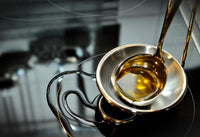Have you ever walked into a space and instantly felt your mood shift because of how it smelled? That's the magic of aromatherapy – a practice that goes far beyond just making your home smell nice. Each room serves a unique purpose, and the right essential oils can dramatically enhance both the function and feeling of that space.
In this complete guide, we'll explore how to harness the power of scent to create the perfect aromatic environment for every corner of your home. Whether you're looking to boost productivity, encourage relaxation, or create a welcoming atmosphere for guests, the right aromatherapy approach can make all the difference.
Your Entryway: Creating Unforgettable First Impressions
The entryway is your home's handshake – it's the first impression visitors receive and your personal transition zone from the outside world to your sanctuary.
Best Essential Oils for Entryways:
- Citrus oils (wild orange, lemon, bergamot): These uplifting scents immediately brighten the mood while naturally purifying air from outside contaminants
- Lavender: Creates a gentle decompression zone, signaling to your brain that it's time to relax
- Cedarwood: Grounds scattered energy after a busy day and establishes a sense of stability
Most Effective Application Methods:
- Reed diffusers provide consistent scent without electricity or maintenance
- Small essential oil diffuser on an entry table creates an immediate scent impact
- DIY doormat refresher sprays with protective essential oils keep unwanted odors at bay
Living Room Aromatherapy: Cultivating Connection and Comfort
Your living room hosts everything from intimate family conversations to lively gatherings. The perfect aromatherapy strategy here adapts to various social situations.
Best Essential Oils for Living Rooms:
- Frankincense: Known as the "contemplative oil," it promotes deeper conversations and mindful presence
- Sweet orange + clove: Creates an instantly welcoming atmosphere that puts guests at ease
- Rosemary: Enhances memory and mental clarity during game nights or important discussions
- Vanilla absolute: Evokes the comforting feeling of freshly-baked goods without the work
Most Effective Application Methods:
- Ultrasonic diffusers with adjustable mist settings allow you to control scent intensity based on gathering size
- Himalayan salt lamps with oil drops for subtle, ambient diffusion
- Essential oil room sprays to quickly refresh the space before unexpected visitors
Real Experience: "I created a special 'Family Time' blend with bergamot, vanilla, and sandalwood that I only diffuse during our weekly game nights. Now my teenagers actually look forward to these evenings – they say the smell puts them in the perfect mood to connect!" – Maria K., Aromatherapy Enthusiast
Kitchen Aromatherapy: Elevating Culinary Experiences
The kitchen already features rich cooking aromas, so your aromatherapy strategy should complement food preparation while enhancing appetite and digestion.
Best Essential Oils for Kitchens:
- Lemon, lime, or grapefruit: These citrus powerhouses cut through lingering cooking odors and grease while providing an energizing clean scent
- Ginger or cardamom: Stimulate appetite naturally and support healthy digestion
- Basil or rosemary: Sharpen focus for cooking tasks while complementing culinary aromas
- Cinnamon or vanilla: Create that irresistible "someone's been baking" atmosphere even when you haven't
Most Effective Application Methods:
- Stovetop simmering pots with fresh herbs and essential oil drops
- Natural cleaning products infused with essential oils for dual-purpose aromatherapy
- Terracotta pendant diffusers hung in discreet locations
- Live herb gardens that provide both aromatic benefits and fresh cooking ingredients
Chef's Secret: Place a drop of lemon, lime, or grapefruit oil on your kitchen trash can liner before installing it – this simple trick neutralizes odors before they start and keeps your kitchen smelling consistently fresh.
Dining Room Aromatherapy: Enhancing Mealtime Connections
Your dining room benefits from subtle aromatherapy that enhances – rather than competes with – the dining experience and encourages meaningful mealtime connections.
Best Essential Oils for Dining Rooms:
- Black pepper or ginger: In minimal amounts, these gently stimulate appetite and support digestion
- Sweet orange or bergamot: Create a cheerful atmosphere that encourages conversation and connection
- Peppermint (used very sparingly): Aids digestion when diffused after meals
Most Effective Application Methods:
- Battery-operated candles with essential oil drops added to the wax top
- Small fresh herb centerpieces that provide natural, food-complementary aromas
- Room sprays used 30 minutes before dining, never during meals
- Scented napkin rings for subtle, localized aromatherapy
Dinner Party Hack: Create a pre-dinner atmosphere with bergamot and ginger to stimulate conversation and appetite, then switch to a very light peppermint diffusion after dessert to aid digestion and signal the meal's conclusion.
Bathroom Aromatherapy: Creating Your Home Spa Experience
Bathrooms benefit tremendously from strategic aromatherapy that purifies air, creates spa-like experiences, and maintains freshness between cleanings.
Best Essential Oils for Bathrooms:
- Eucalyptus or tea tree: These powerhouse purifiers fight mildew and bacteria with their natural antimicrobial properties
- Peppermint: Transforms morning showers into energizing experiences that jump-start your day
- Lavender or chamomile: Create luxury spa-like atmospheres for evening soaks
- Lemongrass: Naturally deodorizes while providing an uplifting, clean scent profile
Most Effective Application Methods:
- DIY shower melts that release scent in hot water and steam
- Essential oil diffuser jewelry hung on shower heads
- Eucalyptus shower bundles hung from shower fixtures
- DIY toilet sprays with essential oils (pre-emptive odor control)
- Bath salts and bombs for immersive aromatherapy experiences
Spa Secret: Hang a small mesh bag filled with whole eucalyptus leaves from your showerhead. The steam activates the natural oils, creating an instant spa experience that clears sinuses and refreshes your bathroom.
Bedroom Aromatherapy: Crafting Your Sleep Sanctuary
Your bedroom deserves aromatherapy that promotes quality sleep, relaxation, and possibly romance, depending on your needs.
Best Essential Oils for Bedrooms:
- Lavender, chamomile, or valerian root: The holy trinity of sleep-supporting essential oils
- Ylang-ylang, rose, or jasmine: Enhance romantic atmosphere with these natural aphrodisiacs
- Sandalwood or cedarwood: Ground scattered energy and reduce bedtime anxiety
- Vanilla: Creates comfort and warmth without being overly stimulating
Most Effective Application Methods:
- Linen sprays misted lightly on pillows and sheets 10 minutes before bedtime
- Essential oil diffusers with auto-shutoff features for safe overnight use
- Aromatherapy jewelry kept on nightstands for personal inhalation
- Pillow sachets with dried lavender refreshed weekly with essential oil drops
Sleep Expert Insight: "The consistency of scent matters more than intensity for sleep improvement. Using the same calming essential oil blend every night creates a powerful conditioned response – your brain begins to prepare for sleep the moment it detects the familiar aroma." – Dr. Rebecca Liu, Sleep Researcher
Home Office Aromatherapy: Boosting Productivity and Creativity
Your workspace requires aromatherapy that enhances concentration, reduces stress, and prevents the mental fatigue that comes with extended focus.
Best Essential Oils for Home Offices:
- Rosemary or basil: Clinically shown to improve memory recall and mental clarity
- Peppermint: Increases alertness and stimulates cognitive performance during afternoon slumps
- Lemon: Promotes concentration while lifting mood during challenging tasks
- Pine or cypress: Reduces stress and anxiety during high-pressure work periods
Most Effective Application Methods:
- Personal desktop diffusers that direct scent toward your workspace
- Essential oil inhaler sticks for direct use during intensive work periods
- Plant-based diffusion using essential oils added to the soil of office plants
- Aromatherapy desk accessories like scented wooden paperweights or pen holders
Productivity Hack: Create three distinct essential oil blends for different work modes: a focusing blend (rosemary, peppermint, lemon), a creativity blend (bergamot, frankincense, cedarwood), and a stress-relief blend (lavender, orange, ylang-ylang). Switch between them based on your current task needs.
Children's Rooms: Safe and Soothing Scent Strategies
When applying aromatherapy in children's spaces, always prioritize gentler approaches with proper dilution and safety considerations.
Best Essential Oils for Children's Rooms:
- Sweet orange or mandarin: Calming without being sedative, perfect for playtime
- Lavender or chamomile (highly diluted): Support restful sleep patterns
- Cedarwood: Grounds energy for hyperactive children while being exceptionally gentle
- Vanilla: Creates security and comfort, especially helpful for younger children
Most Effective Application Methods:
- Heavily diluted room sprays (focus on carrier rather than essential oil)
- Diffuser use limited to 15-30 minutes before bedtime, never during sleep
- Scented stuffed animals with removable sachets that can be refreshed
- Child-safe diffuser jewelry for older children who benefit from portable aromatherapy
Safety First: Always consult with your pediatrician before using essential oils around children, especially those under age 2. Use 1/4 the adult dilution rate and avoid eucalyptus, rosemary, and peppermint in rooms of very young children.
Laundry and Utility Spaces: Functional Freshness
These hardworking spaces benefit from aromatherapy that enhances cleaning effectiveness while creating a sense of lasting freshness.
Best Essential Oils for Utility Spaces:
- Lemon, orange, or grapefruit: Cut through stubborn odors while creating an energizing atmosphere
- Lavender or tea tree: Add natural antimicrobial properties to cleaning routines
- Pine or eucalyptus: Create that unmistakable "freshly-cleaned" scent profile
- Thyme or oregano: Provide powerful antimicrobial benefits for utility areas
Most Effective Application Methods:
- DIY cleaning product recipes incorporating essential oils
- Wool dryer balls with essential oils added before each drying cycle
- Sachets in linen closets and between stored items
- Reed diffusers in laundry rooms for continuous fresh scent
Laundry Game-Changer: Add 5 drops of lavender essential oil to a small spray bottle of water. Lightly mist clothes just before ironing for a subtle, long-lasting fragrance that doesn't require commercial fabric softeners.
Seasonal Aromatherapy: Adapting Your Home's Scent Story Year-Round
The most sophisticated home aromatherapy strategy evolves with the seasons:
Spring Scent Strategy: Focus on fresh, floral scents like geranium, neroli, and jasmine that mirror the outdoor awakening
Summer Scent Strategy: Emphasize cooling, refreshing scents like mint, citrus, and light herbals that create a sense of crispness during hot months
Fall Scent Strategy: Transition to warming spices like cinnamon, cardamom, and clove balanced with sweet orange to create cozy comfort
Winter Scent Strategy: Embrace rich, grounding scents like vanilla, pine, frankincense, and myrrh that create a sanctuary feeling during darker months
Expert Tips for Whole-Home Aromatherapy Success
- Create scent transitions between spaces using complementary oils that flow naturally together
- Consider ventilation patterns in each room when determining diffusion methods and intensity
- Be mindful of household members with sensitivities, allergies, or respiratory conditions
- Layer compatible scents rather than creating competing aromas in adjacent spaces
- Keep a scent journal documenting which combinations work best for different activities and seasons
- Adjust diffusion intensity based on room size, ceiling height, and personal sensitivity
- Develop signature blends that become part of your home's identity and emotional landscape
Your Aromatherapy Journey: Next Steps
Transforming your home through room-specific aromatherapy doesn't happen overnight. Start with one or two rooms where you spend the most time, experiment with different oils and methods, and gradually expand your scent strategy throughout your living space.
Remember that the most effective home aromatherapy isn't about masking odors – it's about intentionally creating environments that support your activities, enhance your wellbeing, and create memorable experiences for everyone who enters your space.








